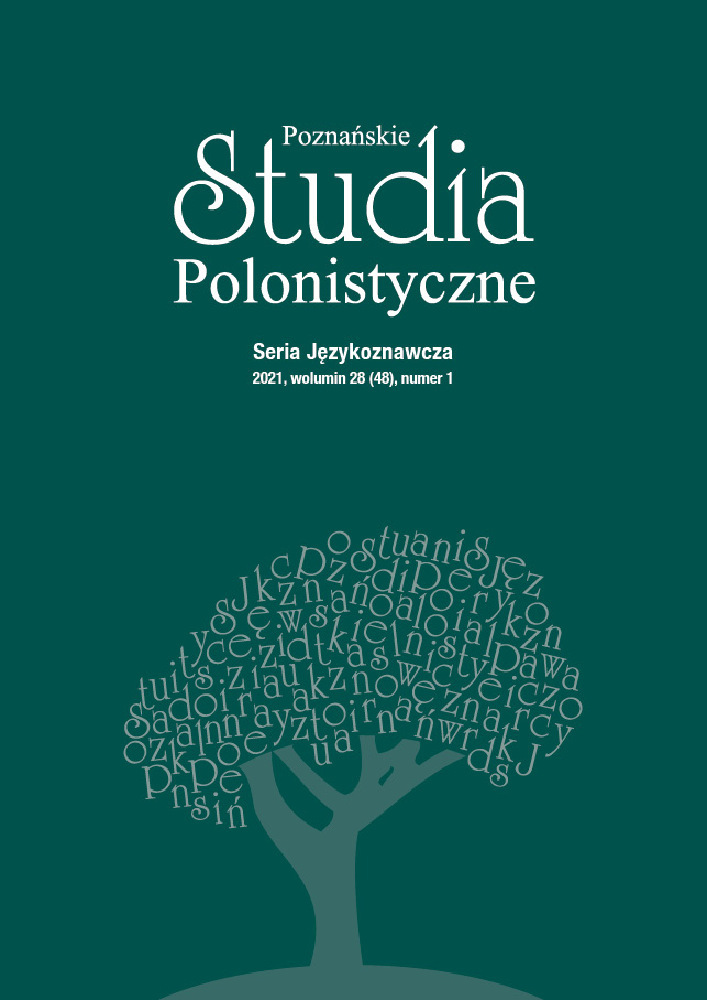Abstract
The subject of the study is the analysis of a series of Internet memes and linguistic jokes made available in pseudomemic form in connection with the COVID-19 pandemic. Comedy itself feeds on any deviations from the norm observed in social, and especially political, life; it captures all the aberrations, nonsense and inconsistencies. The pandemic emergency is fraught with new situations and rules that constitute such a deviation. A vivid social reaction is especially visible in the multisemiotic comic genres, such as Internet memes, due to their channel of entry (the Internet becomes the main channel of communication outside of family communities during social isolation), plasticity and susceptibility to replication. Comic forms, apart from peculiarly ludic and humorous functions, also perform persuasive functions, activating the social need to differentiate between oneself and the stranger, and consequently isolate or integrate certain social groups. In addition, Internet memes also serve as a commentary on current events, thus prompting the audience to take a position. Persuasion dressed in a comic costume seems to be one of the strongest ways of social influence, because it spreads in its innocent and playful form like a viral and becomes firmly fixed in social consciousness.
References
Adamczuk Elżbieta (1993), Komunikowanie się przez humor, Lublin.
Blackmore Susan (2002), Maszyna memowa, Poznań.
Błąd Łukasz (2013), Satyra polityczna w festiwalowych i telewizyjnych programach grup kabaretowych w latach 1989–2007, rozprawa doktorska, https://tinyurl.com/a26ywxcc [dostęp: 20 września 2020].
Brown Rob (2009), Public Relations and the Social Web: How to Use Social Media and Web 2.0 in Communications, Nowy Jork.
Buttler Danuta (1974), Polski dowcip językowy, Warszawa.
Bystroń Jan (1939), Komizm, Lwów–Warszawa.
Chudzik Anna (2018), „Komizm” Jana Stanisława Bystronia w świetle współczesnych teorii humoru, w: Komizm historyczny II, red. Tomasz Korpysz, Anna Krasowska, Warszawa, s. 33−45.
Davison Patric (2012), The Language of Internet Memes, w: The Social Media Reader, red. Joseph Mandiberg, Nowy Jork.
Dziemiok Bohdan (1961), O głównych formach komizmu, „Annales Universitatis Mariae Curie-Skłodowska. Sectio F, Nauki Filozoficzne i Humanistyczne”, t. 16, s. 57−91.
Kamińska Magdalena (2011), Niecne memy. Dwanaście wykładów o kulturze Internetu, Poznań.
Kucharski Adam (2009), Struktura i treść jako wyznaczniki komizmu tekstów humo¬rystycznych, Lublin.
Maćkiewicz Jolanta (2017), Badanie mediów multimodalnych – multimodalne badanie mediów, „Studia Medioznawcze”, s. 33−42.
Marak Katarzyna (2013), Mem internetowy: informacja i transformacja w sieci, w: Netlor. Wiedza cyfrowych tubylców, red. Piotr Grochowski, Toruń, s. 133–165.
Michalewski Kazimierz (2009), Komunikaty mieszane, Łódź.
Niekrewicz Agnieszka Anna (2015), Od schematyzmu do kreacyjności. Język memów internetowych, Gorzów Wielkopolski.
Nowak Jakub (2013), Memy internetowe: teksty (cyfrowej) kultury językiem krytyki społecznej, w: Współczesne media. Język mediów, red. Iwona Hofman, Danuta Kępa-Figura, Lublin, s. 227–238.
Ochwat Paweł (2015), Zjawisko humoru nowoczesne technologie komunikacyjne. Analiza źródeł tworzenia i kanałów przekazu treści humorystycznych, „Kultura. Media. Teologia”, nr 22, s. 33−52.
Tokarz Marek (2006), Argumentacja. Perswazja. Manipulacja. Wykłady z teorii komu¬nikacji, Gdańsk.
Trzynadlowski Jan (1955), Komizm, w: tenże, Studia literackie, Wrocław.
Ziomek Jerzy (1966), Komizm – parodia – trawestacja, w: Prace o literaturze i teatrze ofiarowane Zygmuntowi Szweykowskiemu, red. Stanisław Furmanik, Janusz Macie¬jewski i in., Wrocław, s. 322–339.
License
Authors
The Author declares that they are entitled to personal and property (material) copyrights to their work published in “Poznańskie Studia Polonistyczne. Seria Językoznawcza”, and that these rights are not limited by the terms of Author’s agreement. The Author warrants the originality, authorship, and sole ownership of all rights to the Work, and affirms that they have the right to grant all kinds of licenses hereinabove without infringing on the intellectual property rights of any third party, including personal rights.
The Author(s) retains copyright to their article and the right to freely dispose of the work, granting Adam Mickiewicz University in Poznań a non-exclusive, royalty-free licence under the Attribution-NoDerivatives 4.0 International (CC BY-ND 4.0) Creative Commons licence to use the Work without territorial restrictions for an indefinite period in the fields of use designated in the Author’s agreement.
Users
Interested Internet users are entitled to use works published in „Poznańskie Studia Polonistyczne. Seria Językoznawcza” since 2016 under the following conditions:
- attribution - obligation to provide, together with the distributed work, information about the authorship, title, source (link to the original work, DOI) and the license itself.
- no derivatives - the work must be preserved in its original form, without the author's consent it is not possible to distribute the modified work, such as translations, publications, etc.
Copyrights are reserved for all texts published before 2016.
Other
Adam Mickiewicz University in Poznań retains the right to the journal as a whole (including its layout, graphic design, title, cover design, logo and more).

